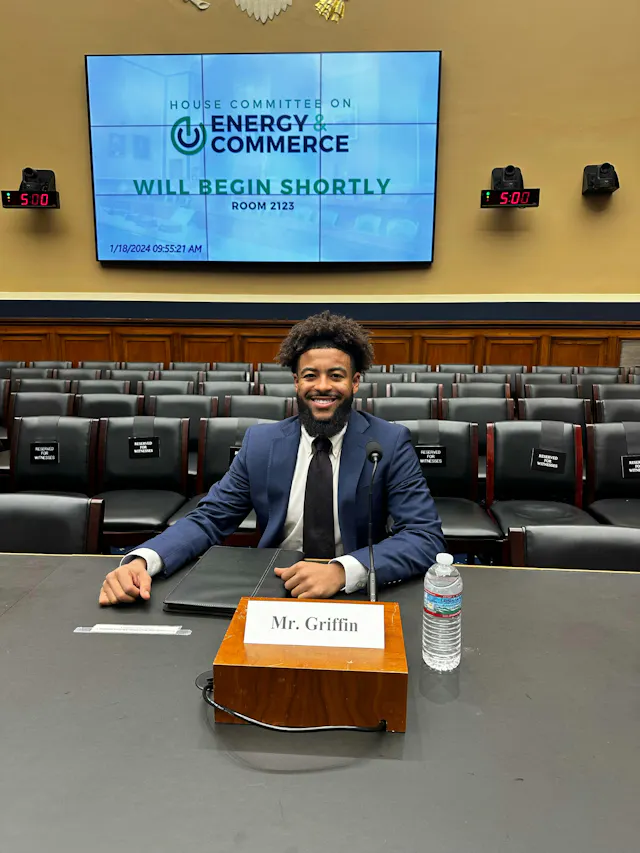Spend enough time researching Name, Image and Likeness (NIL) in collegiate athletics and you’re more than likely to come across a word or two from Chase Griffin.
Since California Governor Gavin Newsom signed the Fair Pay to Play Act (FPPA) into law in 2019 – a landmark piece of legislation allowing athletes the legal right to compensation for the business use of their identities – more than 20 states have followed suit.
A blatant rebuke of the NCAA’s so-called “Never Pay to Play” policy, the FPPA set the ball in motion as the NCAA eventually repealed its decades-old prohibition on athlete earning. The move galvanized a tidal wave of activity in the college sports sphere as athlete-turned creators launched businesses and signed marketing deals worth millions.
As the NIL tsunami swept across the nation, Griffin surfed it.
The UCLA quarterback inked over 40 branding deals, becoming, in a way, a de facto spokesman for the NIL movement itself.
The media’s go-to man for all things related to student athlete compensation, appearing on podcasts, expert panels, and as a featured speaker at scores of events, Griffin was twice named NIL Athlete of the Year. From his earnings, he’s donated nearly $40,000 to community organizations like the Los Angeles Regional Food Bank. And, after earning his Master of Education degree through UCLA’s Transformative Coaching and Leadership program last year, Griffin launched The Athlete’s Bureau (TAB) – a popular business newsletter designed to create community among college athletes and amplify their seldom-heard voices and perspectives.
Four years after California’s adoption of FPPA, with Congress holding a hearing to consider potential regulation of the NIL market, the School of Education and Information Studies graduate was in Washington, D.C. this past week to plead his case to Congress.
Tapped by Congresswoman Lori Trahan (D-Mass.) to speak before the U.S. House of Representatives Committee on Energy & Commerce, Griffin warned lawmakers of the perils he foresees associated with the Fair College Sports Act, a bill championed by Florida Rep. Gus Bilirakis (R-Fla.) that seeks to regulate NIL. Among other components, the legislation proposes to grant the NCAA an antitrust exemption and would classify athletes as non-employees of their respective collegiate institutions.
Griffin, who is currently pursuing a Master of Legal Studies degree at the UCLA School of Law, referenced polls he conducted with The Athlete’s Bureau as well as Generation Lab – a Gen-Z data collection company. He also cited Supreme Court Justice Brett Kavanaugh’s recent comments that the NCAA’s restrictions on athletes “…would be flatly illegal in almost any other industry in America.”
“My goal was to speak truth from the revenue-generating sport perspective,” adds Griffin, whose research reflects that over 60 percent of college athletes support unionizing. “And the Congress members pushed back on me the whole time.
“But I hope my point got across that I’m not an isolated case, but actually an example of what happens a lot of the time in NIL, when college athletes are working with brands, are delivering for brands and are being compensated fairly for it.”
With students contributing to the $16.6 billion dollar industry that is college athletes, Griffin feels they should be compensated fairly for their work.
“In the same way every single other individual in a talent-related industry is compensated,” Griffin says.
Joining him during the hearing’s expert testimony period was NCAA President Charlie Baker, who implored Congress to “adopt reasonable restrictions on third parties” which Baker said have the chance to exert influence in inappropriate ways over athletes.
Griffin pushed back on Baker’s opinion, contending athletes can hold their own in the space.
“You see the phrasing that’s used to talk about NIL and revenue sharing,” Griffin says. “And it’s the same paternalistic terminology that’s been used to extract rights from college athletes in a way where they’re claiming to be ‘protecting us’ from these dangers.
“I hope we don’t move to overregulate the young and up-and-coming industry because of a few bad actors in the collective space that will be weeded out,” he says.
Instead, Griffin asserts that those dangers are in fact learning experiences and the opportunities to change the lives of student athletes and their families.
For the past three months, Griffin and The Athlete’s Bureau have explored legislation related to NIL and athlete’s rights. Recently, TAB published an interview with Arizona State swimmer Grant House who launched a class-action lawsuit against the NCAA, challenging its remaining NIL compensation rules. Just last week, the Ninth Circuit rejected the NCAA’s appeal against class certification in the case.
Born at UCLA’s Santa Monica Medical Center, Chase Griffin ‘23 is a nationally recognized leader in the college Name Image Likeness (NIL) and athlete empowerment movement. He is a two-time winner of National NIL Athlete of the Year awards and has been dubbed by Bloomberg as “The Undisputed King of College Endorsement Deals,” The Los Angeles Times as “UCLA’s Magnetic Marketer,” and “Name Image Likeness Superstar” by ESPN. Griffin is a brand ambassador for JP Morgan Chase, United States Marine Corps, American Eagle Outfitters, Degree (Unilever), Postmates (Uber), Shell, LegalZoom, Champs Sports, United States Polo Association, Lucchese Boots and over 30 additional major brands.
To see Chase Griffin on MSNBC’s “11th Hour with Stephanie Rhule,” visit YouTube.
Learn more about UCLA’s Transformative Coaching and Leadership Master of Education program.
